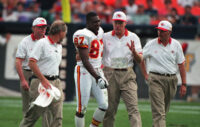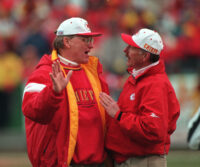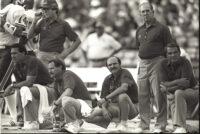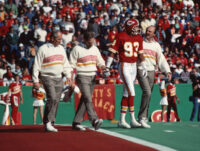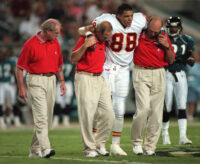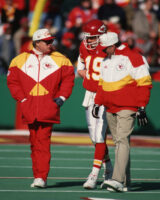Inductees
David Kendall

There are days when David Kendall kicks back and wonders how he ever pulled it all off. Even he can’t believe it at times.
Back in college, a chance meeting with the then-head trainer of the Kansas City Chiefs led to an internship during training camp. Which would seem ho-hum except for the fact that Kendall eventually spent – get this — his entire adult career in athletic training for the Chiefs.
Yes, 30 years with only one employer, a National Football League franchise at that.
“When I look back … how did this possibly happen?” Kendall said with a laugh.
What a career he enjoyed, and his work for the Chiefs is why the Missouri Sports Hall of Fame proudly inducted Kendall with the Class of 2018.
After having served internships in training camp his final three years before graduation at Pittsburg State University, Kendall was as the Chiefs’ Assistant Athletic Trainer from 1977 to 1984. He then was promoted to Head Athletic Trainer, a role he held until 2005.
He was a quiet but key piece of Chiefs playoff teams (1986, 1990-1995, 1997, 2003), and his department was named the Athletic Training Staff of the Year in 1991 by the Professional Football Athletic Trainers Society.
Additionally, he was the Athletic Trainer of the 1994 Pro Bowl as well for the 1987 and 2003 NFL Hall of Fame games. Kendall earned the Fain-Cain Memorial Award as the Outstanding NFL Athletic Trainer of the Year in 2007 from the NFL Physician’s Society.
In other words, he was there every step of the way, from the end of the Len Dawson era and on through the careers of Derrick Thomas and Neil Smith, to name two of many Chiefs stars who fueled the great run of the 1990s during the Carl Peterson-Marty Schottenheimer regime.
Most importantly, he was a pro, telling players and coaches what they didn’t want to hear sometimes. And he also created the prototype of what became a necessity among offensive linemen – a “crude” elbow brace.
“And I mean to tell you,” Kendall said with a smile, “it was crude. It was a knee brace put into an elbow sleeve. But it was the only thing on the market at the time.”
His mentor at Pitt State, trainer Al Ortolani, had introduced him to Wayne Rudy during the 1972 NAIA basketball tournament. Next thing he knows, he’s working for the Chiefs.
“I was extremely lucky in that day and age, coming from a small school, to get to work for an NFL team in almost no time,” said Kendall, a graduate of Wyandotte County High School in Kansas.
“But as I look back,” Kendall joked, “maybe I was the only person who interviewed.”
Rudy took him under his wing and, in a sign of the tremendous respect for their work (and honesty), they were retained through front office and coaching changes. Kendall himself worked for five head coaches after his promotion following Rudy’s retirement.
Most telling of Kendall’s professionalism was this: As much as he loved the Chiefs and Arrowhead on Sundays, he wasn’t afraid to deliver bad news. He didn’t get caught up in the winning. Player safety was most important.
“I would take a player who was questionable right up to Sunday and take him on the field for a full, positional workout,” Kendall said, ready to make a recommendation to Peterson and Schottenheimer and then Dick Vermeil. “Sometimes a player was upset if I felt another week would help him. … You have to manage every emotion.”
Kendall said any Chiefs success health-wise was a collaborative effort, citing Dr. Jon Browne (MSHOF 2017), Dr. Cris Barnthouse and Dr. Mike Monaco as well as Bud Epps, Kendall’s Assistant Athletic Trainer for 20 years.
“I could not have performed my duties or succeeded in my job without (Epps),” Kendall said.
Support from his wife, Jacki, and their daughter, Kristen, made a big difference, too.
“Jacki had an understanding that football was not 8-5,” he said.
After retirement, Kendall volunteered for the Mid-America Intercollegiate Athletics Conference from 2009-2016. He was elected by the Missouri Athletic Trainers Association for Hall of Fame Sports Medicine in 2005 and is a member of the Pitt State Hall of Fame.
He has been part of the National Athletic Trainers Association since 1977.
“Dr. Browne, all physicians I worked with and all the players I worked with,” Kendall said, “they continued to teach me and inspire me to be a better athletic trainer.”
